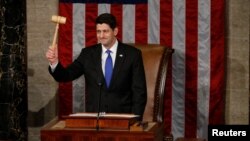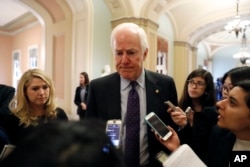Chaos erupted on the first day of a new U.S. Congress on Tuesday as majority Republicans in the House of Representatives first plotted to change ethics oversight rules, then scrapped the plan amid outcry across Capitol Hill and a scolding from President-elect Donald Trump.
House Republicans planned to establish congressional control over the independent, nonpartisan Office of Congressional Ethics, a move that could have limited the watchdog group's ability to investigate lawmakers suspected of ethical or criminal breaches.
In a statement backing the changes, House Speaker Paul Ryan said the OCE "is in need of reform" but insisted it "will continue to operate independently to provide public accountability to Congress."
Hours later, he and other House Republicans reversed course amid a hail of protest from both ends of the Capitol.
"This is incredibly disturbing and a very bad sign of things to come," newly sworn-in Senator Chris Van Hollen told VOA. The Maryland Democrat served seven terms in the House before his election to the Senate in November.
"They are talking about dismantling the independent entity that takes ethics violations charges and reviews them," Van Hollen added. "It's increasing the size of the swamp and giving it more power."
Trump had repeatedly promised to "drain the swamp" in Washington — a reference to the capital's countless power brokers and the cozy relationships among them. Trump himself weighed in Tuesday on Twitter, questioning the need to weaken the OCE in light of "all that Congress has to work on.”
The controversy diverted attention from the customary pomp and ceremony of swearing in House and Senate members at the start of the 115th Congress.
Health care
Even as new and re-elected lawmakers raised their hands and took the oath of office, political undercurrents foreshadowed battles to come.
Republicans, who control both chambers, are planning swift action to repeal President Barack Obama's health care law, known as Obamacare.
"The first job the new Congress will have is to repeal Obamacare," said Republican Senator John Cornyn of Texas. "I believe the verdict of the American people is that Obamacare has failed."
Democrats are insisting on a replacement plan that continues health care coverage for Obamacare participants before the program is scrapped.
"We're going to kick 30 million people off the health care rolls in this country with no plan about how to replace it?" asked Senator Tim Kaine of Virginia. "That's the combined population of 19 [U.S.] states."
Middle East
Republicans in both houses have also crafted measures denouncing a recent United Nations resolution demanding an end to Israeli settlements.
"I'm all for that," Republican Senator Orrin Hatch of Utah told VOA. "The president [Obama] and the administration did great damage [by abstaining on the U.N. vote]."
Asked in what way damage was inflicted, Hatch said, "Well, in screwing up the Middle East."
"A [congressional] resolution is not enough. I want to go after funding [for the United Nations]," Republican Senator Lindsey Graham of South Carolina told VOA. "It's become a body that has lost its way. … America's not going to invest in an international body that singles out the only democracy in the [Mideast] region."
Democrat Kaine said he would reserve judgment until he saw the text of the Senate resolution, but expressed frustration over the stalled Middle East peace process.
"I've been extremely disappointed over the last years," Kaine said. "The U.S. has stood, and the U.N. has stood, for the notion of two states, Israel and Palestine, living peacefully side by side. What is the right role for the United States in trying to promote progress? That's the thing that I'm looking at."
Russia
Meanwhile, at least two congressional committees are expected to hold hearings on Russia's cyber activities, possibly causing friction with Trump, who has downplayed evidence compiled by the Obama administration that Moscow hacked and released data to affect the U.S. presidential election.
"[I want] as much public disclosure as possible about what Russia has done," Graham said. "This is a tactic they are using all over the world."
Exposing the full extent of Russian cyberattacks and taking steps to discourage them are rare points of agreement among prominent Democrats and Republicans on Capitol Hill.
"There's going to be more material put out by the Obama administration about what happened [during the election season]," Kaine said. "I've been briefed on this. I think the intel [intelligence] is beyond question that Russia attempted to influence the outcome of the election. We have to get the facts on the table."
Cabinet nominees
In the legislative battles to come, Republicans will have a two-seat Senate majority and more than a 20-seat advantage in the House. Their slim Senate majority will be put to the test during confirmation battles for some of Trump's more controversial Cabinet picks.
Democrats cannot block nominees on their own, but are promising rigorous scrutiny of Trump's choices to fill key positions.
"Looking at the [proposed] Cabinet, which is stacked with billionaires, corporate executives, titans of Wall Street, and those deeply embedded in Washington's corridors of power, it seems many of his [Trump's] campaign themes are being abandoned," said Democrat Chuck Schumer of New York, the Senate's new minority leader.
For their part, Republicans urged common purpose and bipartisanship in Congress wherever possible.
"Let's not let our desire to fight for fighting's sake get in the way of our ability to work together," Cornyn said.
VOA’s Katherine Gypson and Ken Bredemeier contributed to this report.










